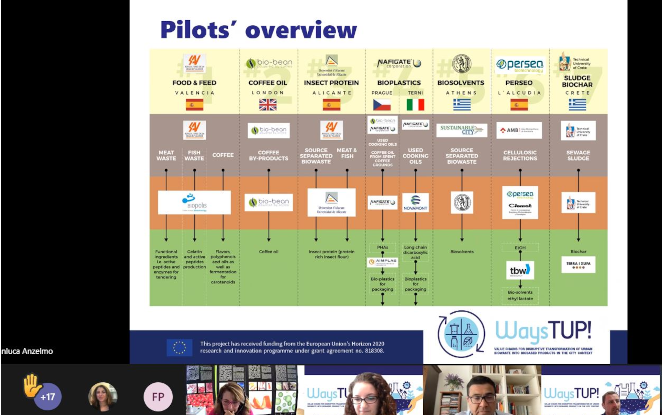Creating bioproducts from waste: the WaysTUP! workshop organized by Novamont
The WaysTUP! project, funded within the European research and innovation program Horizon 2020, organized a series of workshops to present to stakeholders in the partners’ countries the activities and the regional demonstration pilots developed in several European cities which will test the production of bio-based products from raw materials derived from waste.
WaysTUP! aims in fact to demonstrate new value chains for the use of municipal organic waste for the production of bio-based products, starting, for example, from used cooking oil, domestic wet fraction, cellulosic waste derived from municipal wastewater and waste treatment plants and sewage sludge. Launched in September 2019, it involves 27 partners and is coordinated by SOCIEDAD ANONIMA AGRICULTORES DE LAVEGA DE VALENCIA.
On May 25 the Italian workshop "Transforming urban waste into bioproducts", organized by Novamont, partner of the project, was held online. The event, with an interactive approach and divided into sessions, allowed the italian stakeholders to discover the objectives of WaysTUP! and the activities of the Group within the partnership.
During the first session, Mario Bonaccorso, Director of the Italian Technology Cluster of Circular Bioeconomy SPRING, highlighted the value of the bioeconomy in Europe, in particular the valorization of waste as a resource. Susanna Albertini, Founder of the European Bioeconomy Network and expert in bioeconomy communication, then addressed the importance of stakeholder involvement, presenting some interesting case studies.
The second part of the workshop was dedicated to the presentation of the project. Gianluca Anzelmo, Project Manager WaysTUP! and Biotechnologist and PhD Researcher in Novamont, illustrated the contribution of the Group within the partnership, which will test, at the industrial plant in Terni, the use of used cooking oil for the formulation of biomaterials to produce secondary packaging. Roberto Vallero, Polymers Research and Development Unit Novamont, then presented the technologies for the transformation of Mater-Bi and some solutions for bioplastic packaging developed by Novamont. Finally, he recalled the benefits deriving from the use of compostable packaging, which can help reduce the consumption of virgin raw materials, the risks of dispersion into the environment, and return organic carbon to the soil.
WaysTUP! aims in fact to demonstrate new value chains for the use of municipal organic waste for the production of bio-based products, starting, for example, from used cooking oil, domestic wet fraction, cellulosic waste derived from municipal wastewater and waste treatment plants and sewage sludge. Launched in September 2019, it involves 27 partners and is coordinated by SOCIEDAD ANONIMA AGRICULTORES DE LAVEGA DE VALENCIA.
On May 25 the Italian workshop "Transforming urban waste into bioproducts", organized by Novamont, partner of the project, was held online. The event, with an interactive approach and divided into sessions, allowed the italian stakeholders to discover the objectives of WaysTUP! and the activities of the Group within the partnership.
During the first session, Mario Bonaccorso, Director of the Italian Technology Cluster of Circular Bioeconomy SPRING, highlighted the value of the bioeconomy in Europe, in particular the valorization of waste as a resource. Susanna Albertini, Founder of the European Bioeconomy Network and expert in bioeconomy communication, then addressed the importance of stakeholder involvement, presenting some interesting case studies.
The second part of the workshop was dedicated to the presentation of the project. Gianluca Anzelmo, Project Manager WaysTUP! and Biotechnologist and PhD Researcher in Novamont, illustrated the contribution of the Group within the partnership, which will test, at the industrial plant in Terni, the use of used cooking oil for the formulation of biomaterials to produce secondary packaging. Roberto Vallero, Polymers Research and Development Unit Novamont, then presented the technologies for the transformation of Mater-Bi and some solutions for bioplastic packaging developed by Novamont. Finally, he recalled the benefits deriving from the use of compostable packaging, which can help reduce the consumption of virgin raw materials, the risks of dispersion into the environment, and return organic carbon to the soil.

